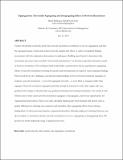Tipping Points: The Gender Segregating and Desegregating Effects of Network Recruitment
Author(s)
Rubineau, Brian; Fernandez, Roberto M
DownloadTippingPoints-Roberto-Fernandez.pdf (1.340Mb)
OPEN_ACCESS_POLICY
Open Access Policy
Creative Commons Attribution-Noncommercial-Share Alike
Terms of use
Metadata
Show full item recordAbstract
Current scholarship commonly posits that network recruitment contributes to job sex segregation and that the segregated nature of personal contact networks explains this effect. A variety of empirical findings inconsistent with this explanation demonstrate its inadequacy. Building on Kanter’s observation that recruitment processes often resemble “homosocial reproduction” [Kanter RM (1977) Men and Women of the Corporation (Basic Books, New York)], we develop a population dynamics model of network recruitment. The resulting formal model builds a parsimonious theory regarding the segregating effects of network recruitment, resolving the puzzles and inconsistencies revealed by recent empirical findings. This revised theory also challenges conventional understandings of how network recruitment segregates: in isolation, network recruitment—even with segregated networks—is more likely to desegregate rather than segregate. Network recruitment segregates primarily through its interactions with other supply-side (e.g., gendered self-sorting) or demand-side (e.g., gendered referring rates) biasing mechanisms. Our model reveals whether and to what extent network recruitment segregates or desegregates, and it reveals opportunities for organizational intervention. There is an easily calculable tipping point where demand-side factors such as gender differences in referring can counteract and neutralize other segregating effects from referring. Independent of other personnel practices, organizational policies affecting employees’ referring behaviors can tip the balance to determine whether network recruitment serves as a segregating or desegregating force. We ground our model empirically using three organizational cases.
Date issued
2015-10Department
Sloan School of ManagementJournal
Organization Science
Publisher
Institute for Operations Research and the Management Sciences (INFORMS)
Citation
Rubineau, Brian, and Fernandez, Roberto M. “Tipping Points: The Gender Segregating and Desegregating Effects of Network Recruitment.” Organization Science 26, 6 (December 2015): 1646–1664 © 2017 Institute for Operations Research and the Management Sciences (INFORMS)
Version: Author's final manuscript
ISSN
1047-7039
1526-5455